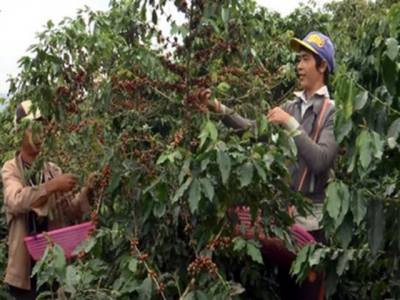Domestic coffee prices bounce back

The price of coffee has undergone another surge during the past week after prices fell to below VND30,000 per kilo in mid-May.
The past week saw the price of coffee beans in central highland provinces rise from VND33,200 to VND33,900 per kilo. Notably, the price of coffee beans in Dak Lak province bounced back to VND34,000 early in the week.
Nguyen Quang Binh, an expert in the coffee industry, said the buying price of coffee beans was between VND34,000 and VND34,200 per kilo early in the week, noting that the price of coffee beans in the central highlands is likely to increase further to between VND34,500 and VND35,000 per kilo later in the week.
The soaring prices of coffee beans can be attributed to the increase in the prices of Arabica and Robusta coffee in the New York and London markets, respectively.
This rise in demand is occurring simultaneously with Brazil, the world’s largest coffee exporter, encountering difficulties in harvest activities due to suffering from a period of heavy rain in coffee cultivation areas.
However, the main reason for the escalation of prices is attributable to the trade war between the world’s largest economies.
According to the Ministry of Industry and Trade, the country’s coffee exports in May reached 135,000 tons, earning US$220 million.
These figures represent a drop of 13.1 per cent in volume and 27.8 per cent in value in comparison with the same period last year.
During the first five months of the year, the nation’s coffee exports hit 767,000 tons, fetching more than US$1.3 billion, down 13.1 per cent in volume and 23 per cent in value against last year’s corresponding period.
Related news
 Country's biggest provider of fruit seedlings improves quality
Country's biggest provider of fruit seedlings improves quality Farmers in Bến Tre Province’s Chợ Lách District, the country largest fruit seedling producer, are using advanced techniques to produce higher-quality seedlings,
 Space renting business for growing greens flourishes in Hanoi
Space renting business for growing greens flourishes in Hanoi The landowners help their customers grow organic veggies following four criteria namely no chemical pesticides, no growth stimulants, no excess of nitrates
 High-quality dragon fruit varieties crucial to boosting exports
High-quality dragon fruit varieties crucial to boosting exports Vietnam should develop quality varieties and improve cultivation techniques if the country wishes to bolster shipments of dragon fruits